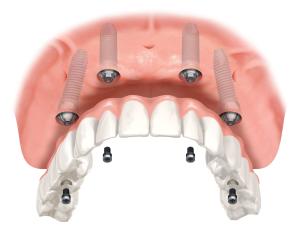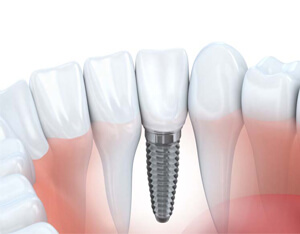- NYC UES Office
- 970 Park Avenue, Suite GFN,
New York, NY 10028
- Carnegie hill Office
- 1175 park avenue,
new york, ny 10128
Dental Implants
All-On-4
Learn MoreBone grafting for implants
Learn MoreReplacing missing teeth
Learn MoreWhat is teeth-in-an-hour?
Learn MoreWhat are Dental Implants?
Dental implants are the most comfortable and permanent solution for missing teeth. Just like natural teeth, dental implants are comprised of a root and crown (the visible part of the tooth that’s used to chew food). The root holds
the tooth securely under the gum and is anchored to the jaw. The difference is that implants are made of titanium.
How Do Dental Implants Work?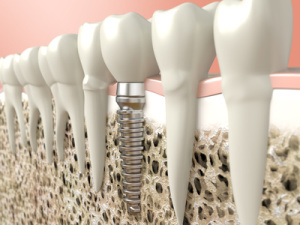
When a tooth is lost, so is both the root and crown. To replace a tooth, the surgeon first replaces the root with a small dental implant. Then, time is allowed for bone to heal and grow around the dental implant. The bone bonds with
the titanium, creating a strong foundation for artificial teeth. A support post (abutment) is then placed on the implant and the new replacement tooth (crown) is placed on top of the post. Many times, a temporary replacement tooth
can be attached to the implant immediately after it is placed.
What is Dental Implant Oral Surgery?
Dental implant surgery replaces damaged or missing teeth with artificial teeth, which are similar to real teeth in both appearance and function. Dental implants are also used to replace tooth roots by fusing metal posts with the
jawbone. This procedure provides a better fit and causes no bone damage, unlike dentures or bridgework. Dental implant surgery is performed in multiple stages, using several procedures and may require several months for proper
healing.
Am I a Candidate for Dental Implant Surgery?
A diagnosis for dental implants is comprised of a series of X-rays and models that will provide a clear picture regarding your specific condition.
Dental implants should be considered if you have the following:
- One or more missing teeth
- Inability or unwillingness to wear dentures
- Healthy oral tissues
- A jawbone that has reached full growth
- Adequate bone to secure the implants
How is The Dental Implant Treatment Performed?
Dental implant treatment takes into account many factors, such as condition of your jawbone, your medical history, current medications, etc.
During your consultation, several anesthesia options will be presented to you including local anesthesia, sedation and general anesthesia. Any dietary restrictions will be discussed with you prior to the procedure.
Dr. Ruben Cohen has the technology to place your implants very precisely and with minimal chair time when multiple dental implants need to be placed. This can be done in one single dental procedure that lasts an hour, also known as
“Teeth-in-an-Hour”.
This technology provides patients with fully functioning teeth using dental implants in one single dental procedure that lasts about an hour. Due to the less invasive nature of this procedure, patients often experience less
post-operative pain, less bruising and less swelling. Often times, patients can resume their normal activities the following day.
What Can I Use For Teeth While the Implants Heal?
Many options are available, and they are tailored to your specific requirements. If you need a replacement tooth while the implants are healing, temporary removable teeth or a temporary bridge can be made. If all of your teeth are
missing, we can usually modify your present complete denture or make you a new temporary denture. If you would prefer non-removable teeth during the healing phase, temporary transitional implants usually can be placed along with the
permanent implants, and temporary teeth may be made and inserted the same day. Depending on your particular situation, some implants can be placed and “loaded” immediately. This means a temporary or permanent replacement tooth can
be placed on, or shortly after, the day the implant is placed.
What are the Potential Health Problems Associated with Dental Implants?
Although it is natural to be concerned about the pain that may be caused by these procedures, most patients do not experience severe or significant post-operative pain. Pain medication and antibiotics will be prescribed for you to
make your recovery as easy as possible. Occasionally, some people develop post-operative infections that require additional antibiotic treatment. Even though great care is taken to place the implant precisely, occasionally adjacent
teeth are injured in the placement process. In addition, there is a chance that the nerve in the lower jaw, which provides sensation to your lower lip and chin, may be affected. If you are missing quite a lot of bone, it might be
difficult to place an implant without infringing on the nerve space. Although we take great care to avoid this nerve, occasionally it is irritated during the procedure, resulting in tingling, numbness or a complete lack of sensation
in your lip, chin or tongue. Usually these altered sensations will resolve within time, but they can be permanent and/or painful.
How Long Do Implants Last?
Implants usually last a long time. When patients are missing all of their teeth, long-term studies (more than 30 years) show an 80 to 90 percent success rate. For patients missing one or several teeth, recent studies show a success
rate of greater than 95 percent, which compares favorably with other areas in the body that receive implant replacement (such as hips or knees). However, if one of your dental implants either doesn’t heal properly or loosens after a
period of time, you may need to have it removed. After the site heals (or on occasion at the time of removal), another implant usually can be placed.
When are the Replacement Teeth Attached to the Implant?
The replacement teeth are usually attached to the implant when adequate healing has occurred and your jawbone is firmly fused to the implant. Depending on a variety of factors, it may be possible to begin this phase of your
treatment immediately or shortly after implant placement. We will review the most appropriate treatment sequence and timing for your particular situation.
The dental work required to complete your treatment is complex. Most of the work involves actually making the new teeth before they are placed. Your treatment begins with specialized impressions that allow us to produce a replica of
your mouth and implants. We will also make “bite” records so that we see the relationship of your upper and lower jaws. With this information, we will make the abutments (support posts) that attach your replacement teeth to your
implants. Various types of abutments exist. Frequently, we can use “off the shelf” abutments. Other times, custom abutments must be made of gold or a tooth-colored ceramic material. As you can imagine, these custom made abutments
add to the cost and treatment time involved. Which abutment to use is a decision that often cannot be made until after healing is complete and impressions have been made.
In general, once your implants are placed, you can expect your tooth replacement treatment to be completed anywhere from 1 to 12 months. It is difficult to give you a specific timeframe for completion of your treatment until after
the implants are ready for restoration.
How Do I Clean My New Teeth?
As with natural teeth, it is important that you clean implant-supported restorations regularly with toothbrushes, floss and any other recommended aids. You should also visit your dentist several times each year for hygiene and
maintenance. As with regular dentures and other tooth replacements, your implants and their associated components are subject to wear and tear and eventually will need repair, including clip replacement, relines, screw tightening,
and other adjustments.
Can One Doctor Perform Everything?
Usually, a dental surgeon places the implant(s) and performs other necessary surgical procedures and your general dentist provides the temporary and permanent replacement teeth. Both doctors are involved in planning your dental
treatment. Also, depending upon a variety of factors, different dental specialists may help with your dental care.
What is the Cost of Dental Implants?
Before treatment begins, every effort will be made to give you an accurate estimate of all the expenses involved in placing the implants and making your replacement teeth. In many cases, there is an initial charge for the diagnostic
work-up, including study models, x-rays, and the fabrication of a surgical template to ensure the best possible result. In addition you will be charged for the abutment or support post(s), plus the crown, dentures, or anything else
that will be placed over the implants, including temporary restorations. Periodic maintenance such as hygiene visits, tissue conditioners, denture relines and other repairs will also incur additional charges.
When different doctors are involved in your treatment, you will be charged separately for their services. We will try to assist you in estimating what your actual payments will be after we evaluate your insurance coverage or other
third party payments. Also, you should consider your personal financial investment in each treatment option as some insurance companies provide limited or no coverage.
Dental Implants Case 1
Patient is unhappy with a bridge that spans the entire upper jaw. The patient is missing most of her teeth on the upper jaw and only six teeth are holding the bridge within her mouth. Patient elects to undergo dental implants by oral
surgeon Ruben Cohen, DDS.
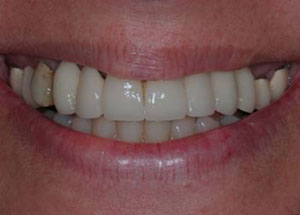
1. Uneven heights of the upper teeth 2. The black lines or spaces at the margins of each crown 3. The appearance of the teeth which look like “chicklets”.
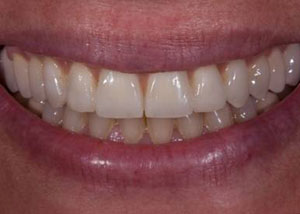
Extensive bone grafting of the upper jaw and dental implant rehabilitation was performed. Note the esthetic shape of the teeth and the even gingival line.
